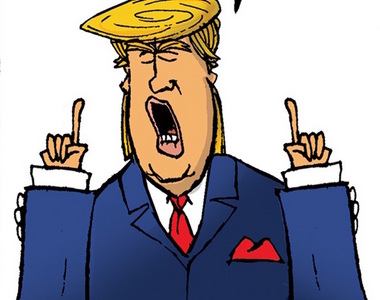by Courtney Udischas
In the weeks that followed the election, I felt I had stepped into the Twilight Zone. All of the colorful assurance I held about living in a time in history when a woman could hold the highest executive office in our country completely drained away. The worst part wasn’t that an unapologetic narcissist was in charge of decisions that would soon affect my life. The worst part was sitting with the knowledge that we proved to ourselves, and to the world, that our priorities haven’t changed much. A television personality, who mirrors the worst aspects of our culture, was a reality more possible than Hillary. The outcry from my generation was considered an overreaction from Trump supporters. The country shifted into a fugue state as we decided to roll the dice with this deeply flawed, dangerous person over a qualified diplomat.
The hate crimes that inundated social media told a story familiar to my grandparents’ generation, when fascism spread across the globe with efficiency. People I knew claimed their own lives, innocent people of color were dying in the streets at the hands of people who had sworn to protect the powerless. Reason had fled as a new, more sinister order was taking hold. Stories about people enduring violence and heartbreak poured out of the queer community. The bathroom bills looming on “Trump’s America” agenda were coming back for another wave of attack. But this time there would be more support from better organized anti-lgbtq groups, and they’d show up in more places around the country. What did this mean for my wife and me, after we spent the last year calling out these people on their transmisogyny, unable to convince groups like “We Just Want Privacy,” who championed safety for all women, that they were excluding our trans sisters.
It was a traumatic year for most people I know. I wanted to believe rationalizing with people would win out over fighting them. For self-preservation, after the election results, my wife and I considered moving to Canada. Deep in our guts, we knew the plan was flawed. We were encouraged by friends living outside the U.S. as they echoed the warning, “This is not normal, you gotta get out of there.” Despite our numerous privileges over people of color and immigrants who Trump threatened to throw out of the country they loved, we wanted nothing more than to leave. It’s paradoxical, but the flight instinct came from a truly personal place. I felt like an adult child, coping with the symptoms of complex post-traumatic stress. I wanted to stay one step in front of my “worst case scenario” fears. It’s something I’ve just begun to grapple with in my adult life—coping with childhood trauma as an adult.
There were times growing up when my household was unstable and felt unsafe, due to the dysfunctional relationship between my parents. In adolescence, I recognized that my home life was not normal, so I had a habit of isolating myself because, in turn, I didn’t feel normal. I felt incapable of fitting into groups of people I admired. Through my teens and into adulthood, that feeling of not being easily accepted followed me, always. When I felt ill at ease around new people, a flight instinct warned me that the place or situation was potentially dangerous. I couldn’t escape the feelings of shame and rejection, which took root in my childhood trauma, but running away was always an option.
Knowing that it’s my responsibility to understand and grow beyond what my inner critic tells me I’m capable of, I started reading a self-help book that focuses on healing the wounded and neglected inner child of adults with complex post-traumatic stress. Pete Walker’s book Complex PTSD: From Surviving to Thriving, outlines the complex manifestations of childhood trauma in four distinct response types: fight, flight, freeze, and fawn. Exhibiting one or a combination of these response types is an act of defense against forces beyond our control. We cannot predict or be responsible for the behaviors of the people in our life, but we can control how we respond to them.
The experiences of our youth irrevocably shape our personalities as we age. Children who have a parent or caretaker who struggles with addiction, for instance, probably didn’t receive the same support and encouragement as kids with parents who did not. Those children typically need to make sense of the dysfunction and tools for recovering from trauma. Others may reject the idea that they are tormented by the past, and lash out at anyone who stands in opposition to them.
Extreme fight types, such as narcissists, according to Walker, are “unconsciously driven by the belief that power and control can create safety, assuage abandonment and secure love.” Children who grow up with controlling, overbearing parents typically experience a strong fight response when triggered. He goes on to explain that “fight types learn to respond to their feelings with anger. Many use contempt, a poisonous blend of narcissistic rage and disgust, to intimidate and shame others into mirroring them.” There is an ongoing list of reasons why Donald Trump is an unfit person to be president. His utter lack of humility is indicative of someone who has neglected to acknowledge the source of his narcissistic tirades. Walker concludes:
Especially devolved fight types can become sociopathic. Sociopathy can range along a continuum that stretches from corrupt politician to vicious criminal. The charming bully behaves in a friendly manner some of the time. He can even occasionally listen and be helpful in small amounts, but he still uses his contempt to overpower and control others.
Whether he’s conscious of it or not, there are grievances so buried in Trump’s psyche, that the only way he can express himself is through contempt and violent outbursts. Our president is a downright bully. He is the incarnation of a damaged child, masquerading as a leader.
To be clear, suggesting that his behavior is a manifestation of childhood trauma is by no means making light of his actions. We have to understand the complexity of narcissists. Recognizing the harmful behavior of bullies is crucial, especially now. Millions of Americans were duped by a false sense of security promised by Donald Trump, a charming bully. The fact that anyone finds him charming is repulsive, so I prefer the term “celebrity bully” instead. As a bully he relies on scapegoats, namely the most disenfranchised members of our society. This is not a person we can confide in. His aversion to the rules and processes of democracy, disobeying the checks of the House of Ethics Committee, is the millionth red flag from the president. Misogyny, racism, xenophobia, and cissexism should not go unnoticed. It will take a collective effort to participate in calling out bigoted, dangerous behavior displayed by our elected officials.
In the famous words of The Twilight Zone creator, Rod Serling, “There are weapons that are simply thoughts, attitudes, prejudices, to be found only in the minds of men. For the record, prejudices can kill and suspicion can destroy…The pity is, these things cannot be contained to the Twilight Zone.” We add vibrancy to the world by living life in our own right, unapologetically. For those of us who have endured past traumas, Trump’s rhetoric is a reminder of why we need to put as much effort as we can into caring for ourselves and others who will suffer at the hands of this new administration. If living is the best revenge, I’m going to do one better and stand up for other people who endure and have yet to experience oppression. It’d be great if I could say the same for our president.
 Courtney Udischas is a writer, mother of five fur babies, and a lost boy at heart. She lives with her wife in the Seattle area.
Courtney Udischas is a writer, mother of five fur babies, and a lost boy at heart. She lives with her wife in the Seattle area.
IMAGE: WALT HANDELSMAN/TRIBUNE CONTENT AGENCY



One thought on “Un-President-Ed: The Trauma of Trump”